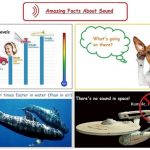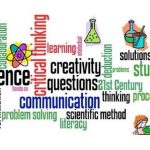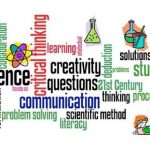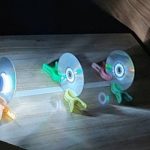Listening to the radio or Television, playing music, shouting at each other – they all depend on the science of sound (and its called acoustics). We cannot see sound waves but we can hear them. They are ripples of high and low pressure in air. The peak (highest point) of the wave is where a […]
Science
Thermal Expansion of a Substance: Concepts & Theories
The expansion of substance when heated is known as thermal expansion. Air, water, iron etc. are substances that expand on heating. When heated to the same temperature, gases will expand more than solids or liquids. Gases exhibit the greatest degree of thermal expansion among the three states of matter. Solids have tightly packed particles and […]
Evaporation: Concepts and Theories
Evaporation concepts and theories for school students. Evaporation is the process by which a liquid changes into a gas or vapor at temperatures below its boiling point. When the liquid is heated formation of vapours takes place which appears in the form of bubbles. Evaporation is a surface phenomenon. Matter is composed of large number […]
Work, Energy and Power: Concepts in Physics
Energy is needed to apply force, force is needed to get work done, and work generates power. Work is said to be done when force applied on a body causes displacement of the body in the direction of force. Power refers to the rate of work done by a force. “Potential Energy” refers to “stored […]
Metals and Non-Metals (Materials): Chemistry
Materials can be classified as metals and non-metals. Both, metals and non-metals are used widely in our daily lives. Metals differ from non-metals based on their physical and chemical properties. Here are some main differences between metals and non-metals: Lustrous: Metals are lustrous whereas non-metals have no lustre. Malleability & ductility: Most metals are malleable […]
Quantum Physics: Understand the Basics
Quantum Physics indicates the existence of alternate realities beyond our everyday concepts and logic. What is Quantum Physics? Quantum Physics is the part of physics that describes the very smallest things in the universe, such as molecules, atoms, sub-atomic parts such as electrons, protons, and neutrons. It is fascinating because everybody around us, including us, […]
‘Machines’ Physics Project (ICSE Class X)
Physics Project for Machines for ICSE Class X students. Project Structure: Introduction, Machine, Functions and uses of simple machines, technical terms related to machines, principle of machine, levers, kinds of levers, pulley, conclusion, bibliography. Introduction A machine is a mechanical structure that uses power to apply forces nd control movement to perform an intended action. […]
Physical Measurements (Physics)
Density of irregular solid Experiment to determine the density of irregular solid. To determine the density of an irregular solid, we have to measure its mass and volume. The mass of the body is measured with the help of a beam balance. To measure the volume of the solid, we use the displacement method i.e. […]
Cool Science Experiments for Kids
Here are some cool science experiments that are safe to be performed at home. Science Fun Experiments at Home Here are some experiments that you can do at home, along with your kids. Tornado in a jarThis is a popular experiment among children of all ages and is pretty simple to do too. Ingredients needed […]
ICSE Class 7 Chemistry: Notes, Solutions, Syllabus
The topics covered in ICSE Class 7 Chemistry provide a strong foundation in chemistry for students, which will enable them to study the subject in greater depth in the higher grades. Topics covered in ICSE Class 7 Chemistry Matter and its composition: Learn important concepts such as what is matter (has mass and occupies space), […]
Air and Atmosphere: ICSE Class 6 Solutions
Air and Atmosphere: ICSE Class 6 notes and solutions Question: State what would happen, if the air above the earth contained mainly oxygen and no nitrogen. Answer: Nitrogen is utilised by plants for their growth and development. It is converted to soluble nitrogenous compounds in the soil in the presence of air and moisture. They […]
ICSE Class-5 Science: Revision notes, questions and answers
ICSE Class-5 Science: Revision Notes, syllabus, question and answers. The following chapters are included in ICSE Class-5 Science subject. The Syllabus (Chapters) of ICSE Class 5 Science includes: Human Body: The Skeletal System Human Body: The Circulatory System Food and Health Pollination Plant Reproduction Interdependence in Living Beings: Plants and Animals Simple Machines Light and […]
Force (Physics) ICSE Class 6: Revision Notes
Revision notes for the chapter ‘Force’ in Physics subject for ICSE Class 6 students. Question: What is the term used for push or pull. Answer: Force Question: Give one example each of a force as (i) a push, (ii)a pull, (iii) a stretch and (iv) a squeeze. Answer: (i) Force as a push: eg. To […]
PN Junction – Semiconductor Electronics
PN Junction – Semiconductor electronics for class 12 physics students. When P-Types and N-Types semiconductor are joined together such that crystal structure remains continuous, a p-n junction is formed. It is formed by adding excessive impurities to n-type semiconductor or donor impurities to a p-type semiconductor. When PN junction is formed, both material will find […]
Electricity and Circuits: Science for School Students
Electricity and Circuits for ICSE, CBSE and other board school students. Q. Define an electric current. Ans: Electric current is the flow of charges. Q. Why do bulbs have two terminals ? Ans: The bulb glows when there is a flow of charge. The flow will be present when charges go in and come out […]
Physical and Chemical Changes: Understand the differences and concepts
Physical and Chemical Changes: Understand the concepts and differences. Find study notes, questions and answers. Explanation of physical change: Physical changes are usually about physical states of matter. It is a type of change in which the form of matter is altered but one substance is not transformed into another. The size or shape of […]
What is a Virus?
People often get cold and flu as the weather changes. We go to the doctor and the doctor says, “Oh it’s a viral infection”. So, What is a Virus? Viruses are a type of germs. They are very tiny, non-living micro-organisms. When they get inside our body they can make us sick Viruses cause cold, […]
Light travels in straight line: School science project
Experiment: Light travels in a straight line Materials needed: Torch, 3 cardboard pieces of the same sizes, Blackboard (or a black-covered book) Procedure: Make a hole in the three cardboards. First Setup: Place the 3 cardboards in a straight line. Place a torch at one end and a blackboard at the other end, with the […]
Evolution of the Early Humans
Evolution of the Early Human beings. Evolution of the Early Humans Around three million years ago, apes and early humans, first appeared on the planet. The first modern humans, originated in Africa. The first human-like creatures, also called hominids, existed millions of years ago. But the hominid species didn’t survive as they were not capable […]
Living and Non-Living Things
Our Planet Earth is made up of several things that have life and some things that do not have life. What are living things? Living things are things that are alive. Living things need air, water, food and shelter to survive. They use energy to move or change shape. Humans, animals, plants are all living […]





